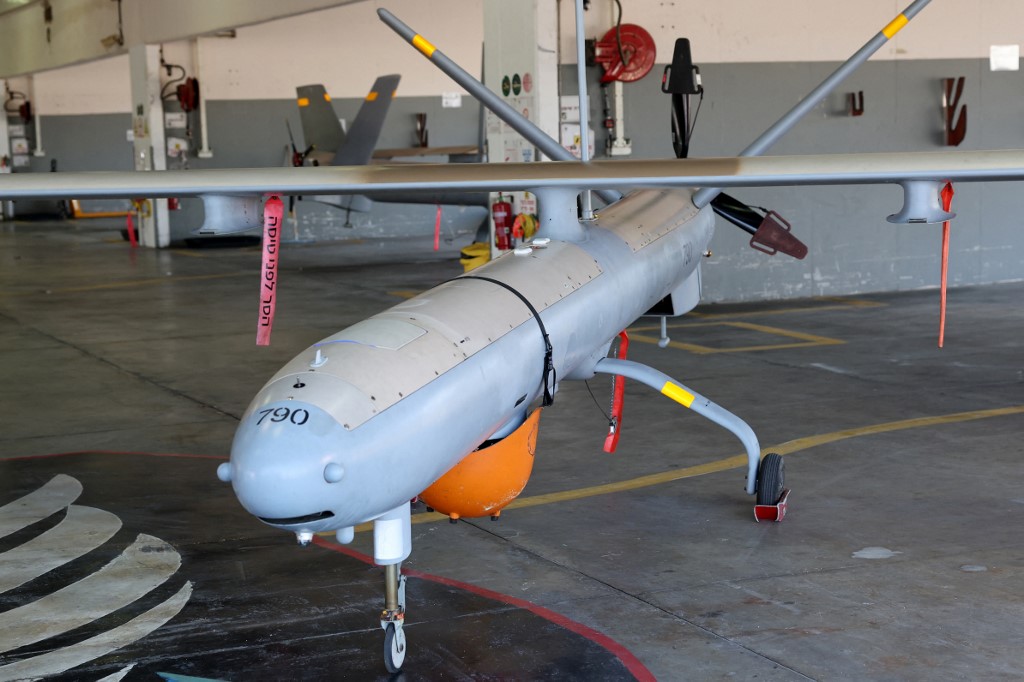Israeli drone in aid worker strikes may have used UK engine, campaigners say

Arms experts and campaigners are questioning whether the drone used by the Israeli military to kill seven aid workers, including three former members of Britain's armed forces, was powered by a UK-made engine.
The World Central Kitchen aid workers had just delivered more that 100 tonnes of food aid to a warehouse in the central Gaza city of Deir al-Balah on Monday when their convoy was reportedly hit multiple times by missiles in an attack involving a Hermes 450 drone.
The attack, which the organisation's founder has said was deliberate and which the Israeli military has called "a grave mistake", has drawn global condemnation and escalated calls within the US and the UK for an end of arms sales to Israel.
It has also drawn scrutiny from arms monitors and aviation experts who say they believe it's possible the drone reportedly involved in the attack was flying with an engine manufactured by the UK-based UAV Engines Limited (UEL).
The company, located in the West Midlands' village of Shenstone, is a subsidiary of the Israeli defence contractor Elbit Systems.
New MEE newsletter: Jerusalem Dispatch
Sign up to get the latest insights and analysis on Israel-Palestine, alongside Turkey Unpacked and other MEE newsletters
"The evidence seems to stack up that it is a UK engine and, if it’s not, then Elbit need to clarify that," Sam Perlo-Freeman, research coordinator at the UK-based Campaigns Against Arms Trade, said on Wednesday.
'The evidence seems to stack up that it is a UK engine and, if it’s not, then Elbit need to clarify that'
- Sam Perlo-Freeman, Campaigns Against Arms Trade
"Definitely it seems to be based on a UK design at the very least."
Among the evidence, said Perlo-Freeman, are specialist websites and reports which say that the Hermes 450 runs on a UK-made engine.
Neither UAV Engines, nor Elbit Systems UK responded to MEE's requests for comment, but an Elbit Systems spokesperson told the Daily Mail that none of its subsidiaries or joint ventures, including UAV Engines, were involved in the Hermes 450 programme.
The Department for Business and Trade declined to say whether it was possible the UK-made components were in the drone used on Monday or if it was investigating the matter.
“We continue to monitor the situation in Gaza," a government spokesman said in response to MEE's questions.
"We welcome Israel's commitment to a full, urgent and transparent inquiry into Monday’s attack and we want to see that happen very quickly.”
Yearslong mystery
Campaigners say the question of the engine has baffled them at least as far back as 2009.
That January, as the Israeli military bombarded Gaza, Amnesty UK said it had uncovered evidence that the specially designed engines propelling drones used by Israeli forces to target air strikes might have been made by UEL in the UK.
At the time, Elbit denied the allegation saying that the engines manufactured in the UK were given to Britain for its drone programme and other international customers, but were not used by the Israeli military.
A month later, government arms control officials admitted that, in the absence of physical checks on exported motors, they were unsure whether UK-made engines had been fitted to Hermes 450 drones used by Israel in Gaza.
Olly Sprague, military, security and police programme director at Amnesty International UK who was one of the researchers looking at the drones at the time, said he's long wondered whether he and others had the full story.
"I’ve been waiting patiently for one of these things to fall out of the sky and for someone to pull the engine out and say, 'That’s made in Britain'," he said.
UEL has been owned by Elbit reportedly since 1995, meaning that the Israeli company also has the "specific patents and knowledge" to build the engine, Sprague said.
"Is there a connection to the UK? Yes, clearly because the engine system on it is of UK origin and design," he said. "Whether they were physically manufactured and exported from the UK and put in the drones is the question."
'Whether they were physically manufactured and exported from the UK and put in the drones is the question'
- Olly Sprague, Amnesty International UK
Sprague said he suspects that engines powering any Hermes 450s now in use in Gaza "were somehow manufactured in Israel using all of the technology, using the know-how they got from the UK company without the UK licencing them directly".
Joe Coles, an aviation journalist of 20 years and editor of the Hush-Kit blog, said it would "be reasonable to say it's likely the engine is British in design, if not manufacture".
But he also theorised that any motors manufactured in the UK may be for the Watchkeeper, the British derivative of the Hermes 450.
Arms monitors said this week they also think it's possible the engine used in the drone may have been exported to Israel from the UK in the early 2000s.
In response to a Freedom of Information request, the Department of International Trade released information last year showing that as recently as 2021, UEL was licenced to send parts for military airplane engines.
However, researchers have also said they have not found a significant number of regular export licences for engines from UEL to Israel, suggesting that they are now produced in Israel.
The UK-based International Centre of Justice for Palestinians, highlighting the FOI request, told MEE the government should definitively rule out whether UK-made engines were in the drones used on Monday.
Mounting pressure
Questions over the drone come as pressure has been mounting on the UK government to halt arms sales to Israel.
A UN investigation found that UK-made components may have been involved in an Israeli military attack in January on a compound housing British doctors working for a UK charity and a US organisation in Gaza.
In a leaked recording reported by the Observer last week, Conservative MP Alicia Kearnes told Tory donors that UK government lawyers have advised officials that Israel has breached humanitarian law in Gaza.
The revelations came after Foreign Office ministers evaded repeated questions on the matter in parliament from MPs across the political spectrum in parliament in March.
The leak, paired with the killing of the three British men in the WCK attack, have sparked high-profiles calls this week, including from a former UK national security adviser and three former supreme court judges along with hundreds of lawyers, for the government to end the sales.
Middle East Eye delivers independent and unrivalled coverage and analysis of the Middle East, North Africa and beyond. To learn more about republishing this content and the associated fees, please fill out this form. More about MEE can be found here.






